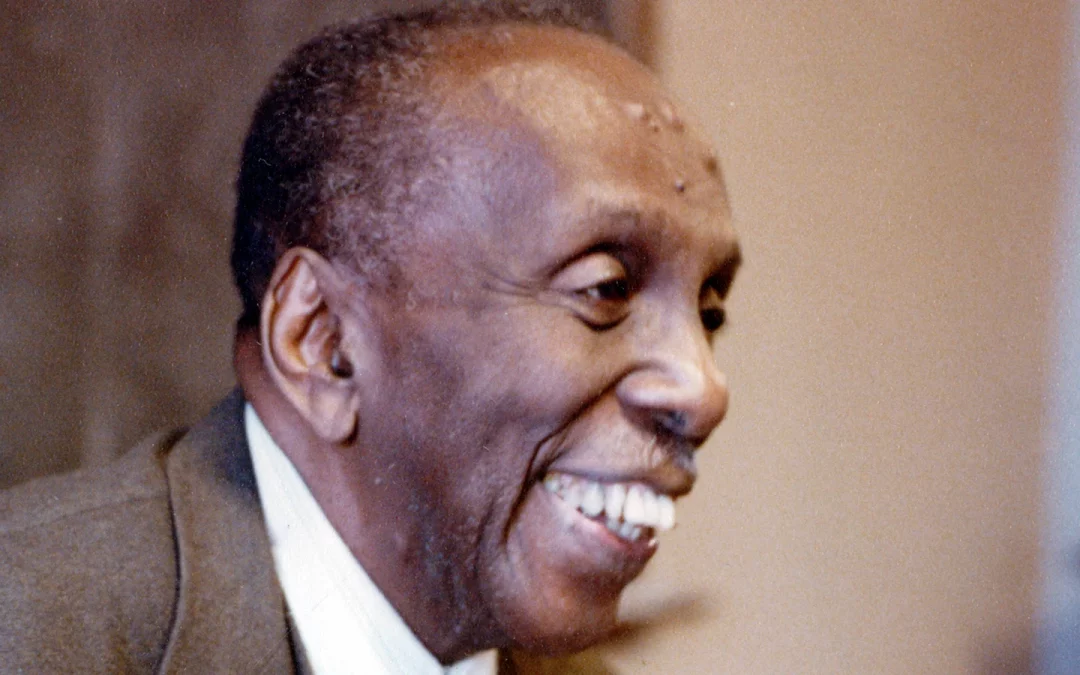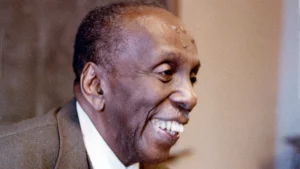
by Adelle M. Banks, RNS | Jan 13, 2022 | Headline News, Social Justice |

Howard Thurman was a theologian and mystic who taught at both Howard University and Boston University. Photo courtesy of Emory University
‘(RNS) — Hartford International University for Religion and Peace has launched its new Howard Thurman Center for Justice and Transformational Ministry, an expansion of its longtime Black Ministries Program, named for the 20th-century theologian and mystic.
Joel N. Lohr, president of the university that previously was known as Hartford Seminary, said the center fits into the school’s strategic plan that focuses on peace building.
“It was my hope that this would be a moment to grow, to envision a center that would do more to support students, justice and ministry,” he said at a Tuesday (Jan. 11) webinar that officially launched the center and was attended by alumni, as well as Thurman’s grandchildren.
The center, which is a $2 million project, is supported by a $1 million grant from the Lilly Endowment Inc. The grant will support a resource center, pay for a Black church scholar and assure that students will not be excluded if they cannot afford the coursework.
The HTC will be led by Bishop Benjamin Watts, who will also continue to lead the Black Ministries Program founded in 1982 by the late Christian Methodist Episcopal Senior Bishop Thomas Hoyt.
“The center’s North Star will be Thurman’s insistence on social justice and responsibility within a spiritual framework,” said Watts in an introductory video during the launch event.
In live comments, Watts spoke of plans to move beyond the center’s regional focus in its two-year certificate course and to become a national model of theological training for pastors and lay people. He said the center also wants to expand the training to include health, wellness and trauma education.
“Those of us of faith have to find ways to continually engage with other persons, and particularly our youth who seem to be falling away from our worship centers,” he said.
During a live interview, Watts asked the Rev. Walter Fluker, editor of “The Papers of Howard Washington Thurman,” to describe the center’s namesake, who died in 1981.
“Thurman, like great mystics — the Dalai Lama, Bishop Tutu — if you meet them, they’re always laughing, because they understand the deep, tragic sense of life and it’s only because of their deep sense of the tragic that they’re able to look at the world and laugh at the world,” said Fluker, a professor at Emory University’s Candler School of Theology. ”To meet Howard Thurman is to meet not a detached mystic unconcerned about the affairs of the world, but a very earthly human being.”
The launch event also featured video comments from the Rev. Andrew Young, a longtime civil rights activist who worked with the Rev. Martin Luther King Jr. and is an alumnus of the Connecticut university, and an interview with former Spelman College President Beverly Daniel Tatum, who earned a master’s in religious studies from the school.
READ THIS STORY AT RELIGIONNEWS.COM
by Christine A. Scheller | Sep 20, 2011 | Feature, Headline News |
Racial and Ethnic Congregations Grow
Racial and ethnic congregations are bucking a trend toward decreasing vitality in American congregations, according to a new study published by the Hartford Institute for Religion Research. The study, “A Decade of Change in American Congregations: 2000-2010,” was presented along with the latest Baylor Religion Survey at the Religion Newswriters Assocation annual conference in Durham, North Carolina, last weekend.
Congregations with 50 percent or more minority participants grew from about one-fourth of all U.S. congregations in 2000 to nearly one-third in 2010, the study revealed, but overall, there was a steep decline in the financial health of American congregations, as well as continuing high levels of conflict, aging memberships, and declining numbers.
Injecting Vitality into American Religious Life
The contrast between the growth of racial/ethnic congregations and the weakening of others was presented in light of census projections that show people of color becoming a majority of the U.S. population by 2050 and the number of non-white children born in the United States exceeding 50 percent by 2023.
Non-white Americans are, “by and large,” creating their own congregations rather than participating in historically White ones, the report said. Nonetheless, racial/ethnic congregations are injecting a “strong dose of growth and vitality into America’s religious life.”
These congregations are disproportionately Evangelical Protestant or non-Christian, urban and Southern. Their worship is more likely to be contemporary and innovative, which is significant because the study found that innovative, contemporary worship correlates with high spiritual vitality and numerical growth.
Racial/ethnic congregations are more likely to hold to a theology that is moderate or liberal than majority White congregations, but their use of technology tends to be modest to marginal. On average, they count less college graduates amongst their numbers, but they benefit from retention of their young adults.
Poor Financial Health, but Encouragement for Entrepreneurship
Black churches may be in better shape spiritually than White ones, but they lag behind in financial health, Hartford found. And yet, they are unique in their encouragement of entrepreneurship and profit-making.
Baylor University’s “Values and Beliefs of the American Public” study found that Black Protestants (98%) were more likely than any other group to agree that “anything is possible for those who work hard.”
Baylor’s researchers also found that more African American working adults attach religious significance to their work than do Whites or Hispanics. Half said they view their work as “a mission from God” and pursue excellence in their work because of faith, as compared to approximately one-third or less of Whites and Hispanics.
Work as a Calling
“The idea of work as a religious calling is most prominent in the Black church tradition of American Protestantism,” said Kevin D. Dougherty, associate professor of Sociology and a research fellow at Baylor’s Institute for Studies of Religion. “It’s in these churches where adherents are making stronger connections between work and faith.”
Black Protestant respondents are more than two-and-a-half times more likely than the religiously unaffiliated or adherents of other religious traditions to say that their faith community encourages them to start a business. Likewise, they’re more likely to feel encouragement from their church to make a profit in business, Dougherty explained.
Responding to Economic Reality
“There are both pragmatic and theological reasons why this might be so,” said Dougherty. “The black church has played an instrumental role in the African American community on a whole range of issues, including economic issues.”
He suggested that the emphasis on entrepreneurship and profits can also be understood as a response to high rates of unemployment and underemployment in the African American community.
“A second reason though is theological, the belief that God rewards faithful believers with financial prosperity and good health. The ‘health and wealth’ gospel is a popular message within African American congregations,” he speculated.
Afterlife Beliefs Lead to Good Work Habits
The study additionally revealed that 75 percent of Black Protestants believe in Heaven and 73 percent, more than any other group, believe in Hell. These beliefs were overwhelmingly associated with a commitment to job satisfaction.
“Persons who absolutely believe in Heaven and Hell overwhelmingly agree that the organization for which they work has a great deal of meaning to them,” the report said. These believers are also “always” or “often” motivated by their faith to pursue excellence in their work.
Dougherty noted, however, that among people affiliated with a religious group, there’s no difference in whether or not people pursue excellence because of faith.
“Catholic, Jew, and Protestants answered about equally in this regard. It’s only on the issue of calling that we find these differences of religious tradition,” he said.
What do you think?
Are racial and ethnic churches healthier than majority White churches?
Does your church encourage entrepreneurship and profit-making?
Do Black churches embrace the prosperity gospel message more than other churches, or does the researcher need to stick to the numbers?


